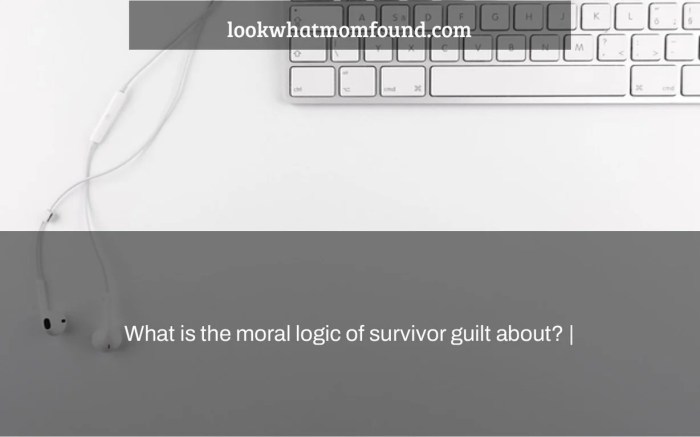The moral logic of survivor guilt by nancy sherman – Nancy Sherman’s exploration of “The Moral Logic of Survivor Guilt” delves into the profound emotional and ethical complexities of this pervasive phenomenon. Survivor guilt, a psychological response to surviving a traumatic event while others perish, raises fundamental questions about our moral obligations, societal expectations, and the search for meaning in the face of adversity.
This discourse examines the multifaceted nature of survivor guilt, its causes and triggers, and the strategies for coping with its emotional burden. By exploring cultural perspectives, literary representations, and real-life case studies, we gain a deeper understanding of the ethical and societal implications of this complex experience.
Defining Survivor Guilt
Survivor guilt is a complex emotional response experienced by individuals who have survived a traumatic event while others have not. It is characterized by intense feelings of guilt, shame, and inadequacy for having survived while others have perished or suffered more severely.
Factors that contribute to survivor guilt can include:
- Witnessing or experiencing the death of others
- Feeling responsible for the survival of others
- Perceiving oneself as undeserving of survival
- Experiencing a sense of isolation or estrangement from others
Situations that can trigger survivor guilt include:
- Natural disasters
- War and combat
- Accidents
- Terrorist attacks
- Violent crimes
Moral Implications of Survivor Guilt

Survivor guilt can have profound moral implications. Individuals may feel obligated to honor the memory of those who did not survive by living their lives to the fullest or by dedicating their lives to a cause related to the traumatic event.
However, these feelings of obligation can conflict with societal expectations that survivors should move on and return to their normal lives. This can lead to feelings of guilt and shame if survivors are unable to meet these expectations.
Survivor guilt also raises ethical considerations regarding responsibility, gratitude, and forgiveness. Survivors may feel responsible for the deaths of others or for their own survival, which can lead to feelings of guilt and self-blame. They may also feel grateful for their survival, which can be accompanied by feelings of guilt for not being able to save others.
Coping with Survivor Guilt: The Moral Logic Of Survivor Guilt By Nancy Sherman
Coping with survivor guilt can be a challenging process. It is important for survivors to seek professional help if they are struggling to manage their emotions. Therapy can help survivors understand their guilt and develop coping mechanisms.
There are a number of strategies that survivors can use to cope with survivor guilt, including:
- Talking about their experiences with trusted friends, family members, or therapists
- Joining support groups for survivors of trauma
- Engaging in activities that bring them joy and purpose
- Practicing self-compassion and forgiveness
Detailed FAQs
What is survivor guilt?
Survivor guilt is a complex emotional response experienced by individuals who have survived a traumatic event in which others have perished. It involves feelings of guilt, shame, and responsibility for the survival of others.
What are the common triggers for survivor guilt?
Survivor guilt can be triggered by a wide range of traumatic events, including natural disasters, accidents, wars, and interpersonal violence. It can also be triggered by the death of a loved one, even if the death was not the result of a traumatic event.
How can I cope with survivor guilt?
Coping with survivor guilt requires a multifaceted approach that may include seeking professional help, joining support groups, practicing self-care, and engaging in activities that bring meaning and purpose to life.